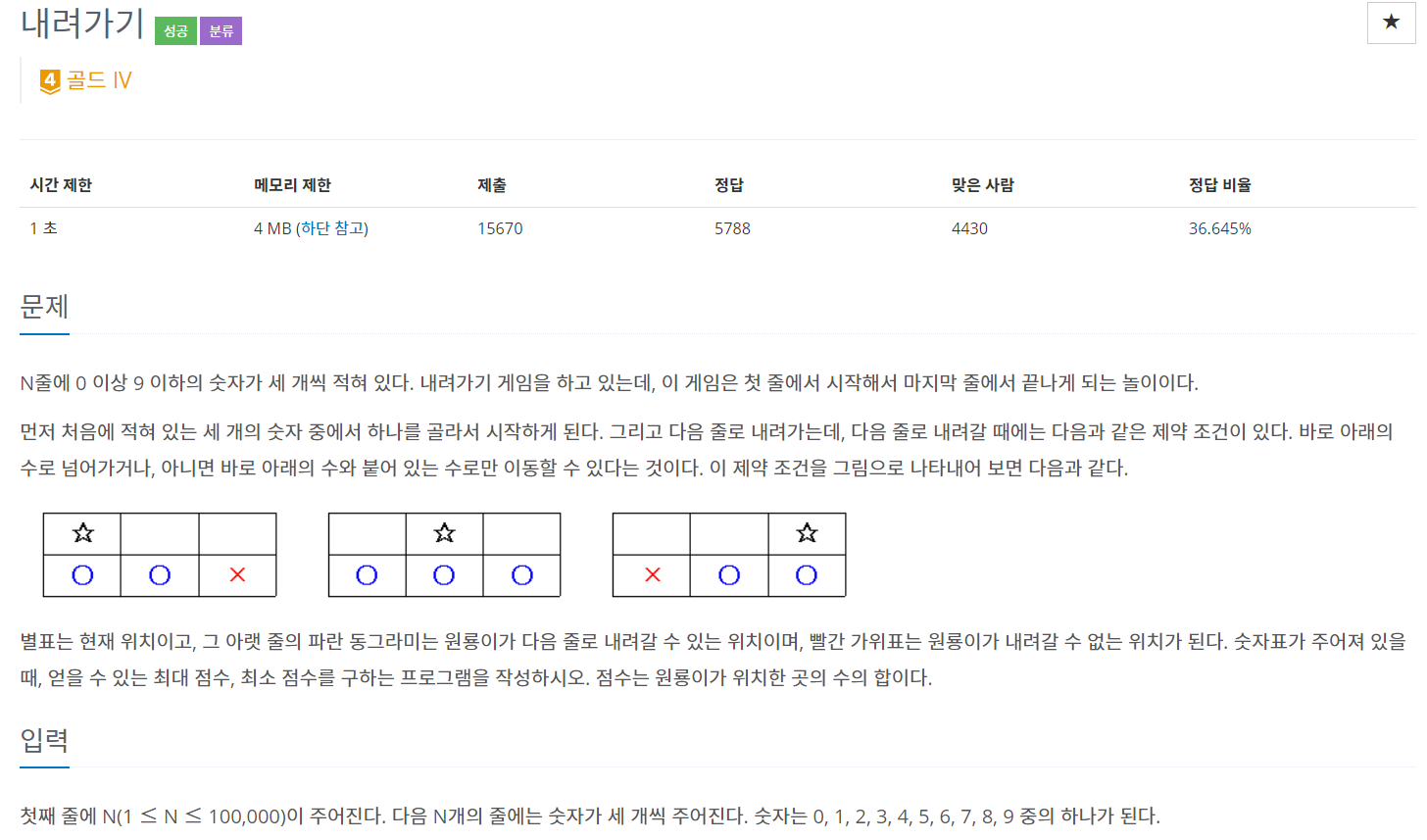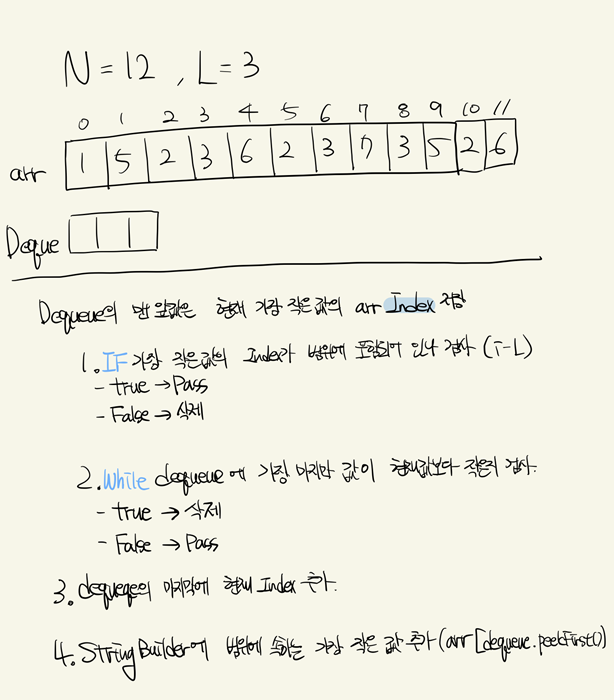

슬라이딩 윈도우 정리
Algorithm
2021.02.03.
슬라이딩 윈도우
투포인터 알고리즘과 비슷하지만 슬라이딩 윈도우는 어느 순간에도 그 구간의 넓이가 동일하다
-> 사용하지 않는 값을 삭제하거나 갱신하는 기법이다.
백준 2096번 - 내려가기


풀이
이 문제는 슬라이딩 윈도우 + DP문제다.
문제를 보면 메모리 제한이 있다.
계단의 최대값과 최솟값을 저장하는데 이전의 값들만 저장하고 있으면 된다.
package slidingWindow;
import java.io.BufferedReader;
import java.io.IOException;
import java.io.InputStreamReader;
import java.util.Arrays;
public class num2096 {
static int N, MAX, MIN;
static int[] tempMaxDp, tempMinDp, maxDp, minDp;
public static void main(String[] args) throws IOException {
BufferedReader br = new BufferedReader(new InputStreamReader(System.in));
N = stoi(br.readLine());
tempMaxDp = new int[3]; tempMinDp = new int[3]; maxDp = new int[3]; minDp = new int[3];
for(int i=0; i<N; i++) {
String[] step = br.readLine().split(" ");
for(int j=0; j<3; j++) {
tempMinDp[j] = tempMaxDp[j] = stoi(step[j]);
tempMaxDp[j] += Math.max(maxDp[1] , j == 1 ? Math.max(maxDp[0], maxDp[2]) : maxDp[j]);
tempMinDp[j] += Math.min(minDp[1] , j == 1 ? Math.min(minDp[0], minDp[2]) : minDp[j]);
MAX = j==0 ? tempMaxDp[j] : MAX > tempMaxDp[j] ? MAX : tempMaxDp[j];
MIN = j==0 ? tempMinDp[j] : MIN < tempMinDp[j] ? MIN : tempMinDp[j];
}
arrayCopy(maxDp, tempMaxDp);
arrayCopy(minDp, tempMinDp);
}
System.out.println(MAX + " " + MIN);
}
public static void arrayCopy(int[] to, int[] from) {
for(int i=0; i<3; i++) {
to[i] = from[i];
}
}
public static int stoi(String string) {
return Integer.parseInt(string);
}
}
백준 11003번 - 최솟값 찾기


풀이
문제를 보면 범위가 심상치 않다…ㅋㅋㅋ
문제가 좀 어려워서 노트로 작성하면서 정리했다.

package slidingWindow;
import java.io.*;
import java.util.*;
public class num11003 {
public static void main(String[] args) throws Exception {
BufferedReader br = new BufferedReader(new InputStreamReader(System.in));
BufferedWriter bw = new BufferedWriter(new OutputStreamWriter(System.out));
Deque<Integer> deque = new LinkedList<>();
StringTokenizer st = new StringTokenizer(br.readLine(), " ");
int N = stoi(st.nextToken());
int L = stoi(st.nextToken());
int[] arr = new int[N];
st = new StringTokenizer(br.readLine(), " ");
StringBuilder sb = new StringBuilder();
for (int i = 0; i < N; i++) {
arr[i] = stoi(st.nextToken());
if (!deque.isEmpty() && deque.getFirst() <= i - L) {
deque.removeFirst();
}
while (!deque.isEmpty() && arr[deque.getLast()] > arr[i]) {
deque.removeLast();
}
deque.addLast(i);
sb.append(arr[deque.peekFirst()] + " ");
}
bw.write(sb.toString());
bw.flush();
bw.close();
}
public static int stoi(String string) {
return Integer.parseInt(string);
}
}백준 3078번 - 좋은 친구


풀이
이전 문제를 풀었다면 어렵지 않게 풀 수 있다.
cnt범위 때문에 long으로 설정해야 한다.
cnt 때문에 책상 부술뻔… 후…하…후…하…
package slidingWindow;
import java.io.BufferedReader;
import java.io.IOException;
import java.io.InputStreamReader;
import java.util.LinkedList;
import java.util.Queue;
import java.util.StringTokenizer;
public class num3078 {
static int N, K;
static long cnt=0;
static Queue[] qarr;
public static void main(String[] args) throws IOException {
BufferedReader br = new BufferedReader(new InputStreamReader(System.in));
StringTokenizer st = new StringTokenizer(br.readLine());
N = stoi(st.nextToken());
K = stoi(st.nextToken());
qarr = new Queue[21];
for(int i=0; i<=20; i++) {
qarr[i] = new LinkedList<Integer>();
}
for(int i=0; i<N; i++) {
int nowLen = br.readLine().length();
if(qarr[nowLen].isEmpty()) {
qarr[nowLen].offer(i);
}else {
while ((i - (int) qarr[nowLen].peek()) > K) {
qarr[nowLen].poll();
if (qarr[nowLen].isEmpty()) {
break;
}
}
cnt += qarr[nowLen].size();
qarr[nowLen].offer(i);
}
}
System.out.println(cnt);
}
static int stoi(String string) {
return Integer.parseInt(string);
}
}